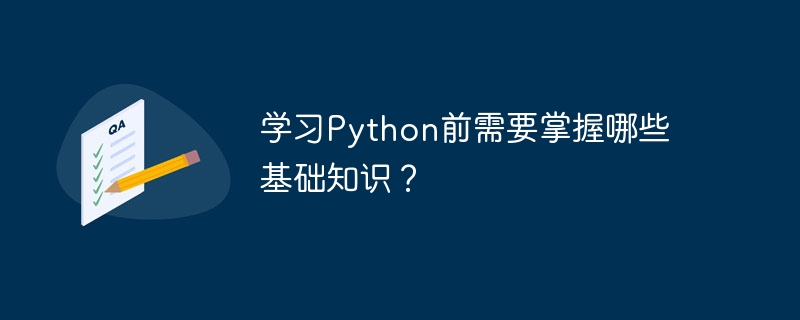
What basic knowledge do you need to master before learning Python?
With the continuous development of technologies such as artificial intelligence, big data and cloud computing, programming has become an increasingly important skill in modern society. As a simple, easy-to-learn and powerful programming language, Python is increasingly favored by programmers and beginners. If you also plan to learn Python, there are some basic knowledge that you must master before starting.
- Understand the basic concepts of programming
Before you start learning any programming language, you first need to understand some basic programming concepts. For example, learn what variables, functions, loops, conditional statements are, etc. These concepts are the cornerstones of programming and are important for understanding how Python works and writing effective code.
- Familiar with the basic syntax of Python
Python has a set of concise and easy-to-understand syntax rules. Before learning Python, you need to have a certain understanding of the basic syntax of Python, such as the indentation rules in Python, the naming convention of variables, the use of comments, etc. Here is a simple Python code example:
# 定义一个变量
message = "Hello, World!"
# 打印变量的值
print(message)
Copy after login
In this example, use the equal sign (=) to assign a value to the variable message. Then by using the print() function, the value of the variable message can be printed out.
- Learn Python’s basic data types and data structures
Python supports a variety of data types, including integers, floating point numbers, strings, lists, tuples, and dictionaries. Before learning Python, you need to understand the characteristics and usage of each data type. These data types are the most basic elements in writing programs, and mastering them allows you to better process and manipulate data.
- Master the basic operations and functions of Python
Learning Python also requires mastering some basic operations and common functions. For example, learn how to perform mathematical operations, string concatenation, list and dictionary operations, etc. Python provides many built-in functions, such as len() to get the length of a list, split() to split a string, etc. Proficiency in these operations and common functions can improve the efficiency of writing code.
- Familiar with flow control and loop structures
In programming, flow control and loop structures are very important. Before learning Python, you need to be familiar with how to use if statements to implement conditional judgments, and how to use for loops and while loops to repeatedly perform certain tasks. Mastering flow control and looping structures can help you write more flexible and efficient code.
- Learn to use Python modules and libraries
Python has a wealth of modules and libraries that can help us simplify programming tasks. Before learning Python, you need to know how to use Python's own modules and third-party libraries. For example, the random module is commonly used to generate random numbers, the "Pandas" library is used for data analysis and processing, and the matplotlib library is used to draw charts, etc. Familiarity with these modules and libraries can improve programming efficiency and flexibility.
To summarize, the basic knowledge you need to master before learning Python includes basic programming concepts, Python’s basic syntax, data types and data structures, basic operations and functions, flow control and loop structures, and Python’s Usage of modules and libraries, etc. By mastering these basics, you will be able to better understand how Python works and write efficient code.
I hope the above content will be helpful to you, and I wish you success on the road to learning Python!
The above is the detailed content of What are the basic knowledge necessary for learning Python?. For more information, please follow other related articles on the PHP Chinese website!






